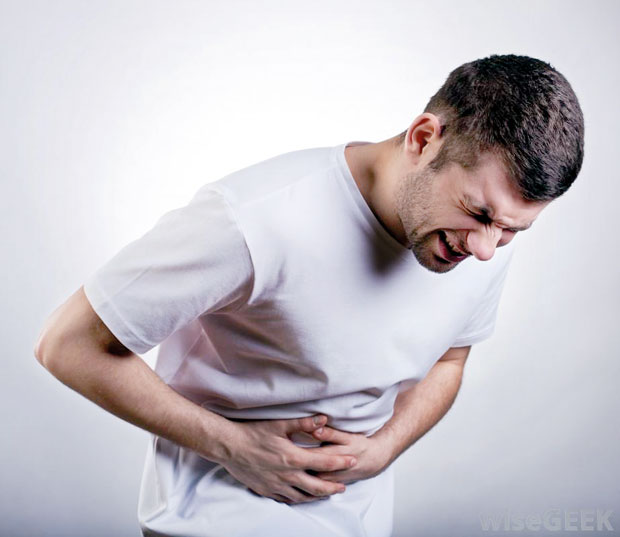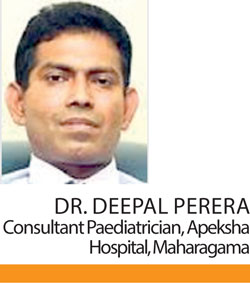22 Dec 2017 - {{hitsCtrl.values.hits}}

 Since recent times the stomach bug has plagued many people. Patients experience great discomfort when the stomach bug ‘bites’ them. Although it seems like a simple disease, if not treated properly and immediately there can be dire complications. Speaking to the Health Capsule, Dr. Deepal Perera, Consultant Paediatrician, Apeksha Hospital, Maharagama said, “It’s known as gastroenteritis. It may be acute or be chronic.” He further explained that one of the most important things that should be done is to give the patient adequate fluid as he/she loses fluids through diarrhea and vomiting. The doctor warned that given such a condition a patient can go into shock and even die from dehydration.
Since recent times the stomach bug has plagued many people. Patients experience great discomfort when the stomach bug ‘bites’ them. Although it seems like a simple disease, if not treated properly and immediately there can be dire complications. Speaking to the Health Capsule, Dr. Deepal Perera, Consultant Paediatrician, Apeksha Hospital, Maharagama said, “It’s known as gastroenteritis. It may be acute or be chronic.” He further explained that one of the most important things that should be done is to give the patient adequate fluid as he/she loses fluids through diarrhea and vomiting. The doctor warned that given such a condition a patient can go into shock and even die from dehydration.
Identification
Speaking of the symptoms that are often present, the doctor said, “Symptoms include, fever, vomiting, nauseated feelings, abdominal pain, feeling uncomfortable, loose stools. Loose stools may be watery or it may be with blood or with or without mucus.”
How it occurs
Dr. Perera further said that there are several causes for this condition. “One is viral. The main virus we know of is rotavirus. The others are bacterial. Mainly Rovella, Shigella, Ecolii and Campylobacter. Although we don’t see it there is also amoeba. Bacteria, viral and even fungal infections can cause the stomach bug. If it is bloody diarrhea there are certain causes for this. Some bacteria such as Salmonella, Shigella, E. coli can cause blood and mucus in diarrhea. Amoeba can sometimes be the cause, but we don’t see it now. If it is viral, such as Rotavirus, it is infectious and can infect other family members and even spread to a class or a Montessori and affect other students,” said Dr. Perera. He explained that this illness can spread through food and water or when people don’t wash their hands properly after using the washroom”.
Complications
The doctor further explained that there are many complications that can occur, such as, dehydration, electrolyte imbalance, septicaemia etc. “There are complications. The main complication is dehydration. With dehydration the patient can go into shock and even collapse and die. The cause for this can be either viral or bacterial. Bacteria can cause Septicaemia, which is blood poisoning. The bacteria can spread through the blood all over the body and again cause shock. Another complication that can occur is Hemolytic Uremic Syndrome which damages the kidneys. This could cause low urine output. Dehydration also causes low urine output. Further complications include Hematuria which is blood in urine. Diarrhea can cause an electrolyte imbalance, that is low sodium, low potassium, low calcium. Low potassium could cause abdominal distension. Further, what we call paralytic ileus can also happen. This is when the bowel is not working properly. In such situations if you feed the child, it will vomit and you will get more abdominal distention. Furthermore, patients with diarrhea can go into fits because of the low blood sugar and low sodium.” explained Dr. Perera
Treatment
Speaking of the treatment Dr. Perera explained how different symptoms are treated. “The most important thing is hydration. For any stomach bug or loose stools we should provide the oral rehydration solution or what is more commonly known here as Jeevani. Giving natural fluids too is very important. Natural fluids that patients should have include, king coconut water, congee water, lime juice, lemon juice, promegranate, bananas or even toast. Bananas and honey are very good for people suffering from the stomach bug. However, green leaves, papaya, oils, butter should not be given to patients who are suffering from loose stools. Giving adequate fluids is one of the most important steps in treatment,”the doctor said.
“If there is vomiting we can’t give oral fluids, so the vomiting too has to be treated. Vomiting can be stopped by giving either tablets, syrups or IV drugs. This is to make sure that you have adequate fluids. Sometimes when giving oral fluids while vomiting is present, we should make sure to continue with IV fluids overnight or for the next 24 hours. We don’t give anti-diarrheal drugs to children. The diarrhea needs to pass and the stomach has to settle. If the patient’s stomach is really hurting or there is gastritis, antacids can be given,” he continued.
Speaking of treating bacterial infections he said, “Only when it is necessary should antibiotics be given. If we suspect bacterial action, such as when blood and mucus are seen in the stools, we may give antibiotics. Furthermore, a stools culture report can be obtained in order to find out the organism and later treat it. If it is typhoid or bacillus dysentery, where there is the presence of blood and mucus diarrhea, we should notify necessary officials. The one thing that I have noticed in the last few months and even in the last few years, is that some children who obtain water from wells in the Colombo District and the suburbs, develop typhoid fever. To avoid this, chlorine needs to be added to the well water. Otherwise, it is not like water from the water board. Sometimes it can be contaminated with e colii, the bacteria which is present in stools,”he said. Moreover Dr. Perera explained,“Apart from antibiotics and probiotics prebiotics can be used when treating loose stools. These are good for patients who have diarrhea. Further, it was recently found that Zinc, the element, is good for diarrhea, in order to shorten the duration of this illness.”
Prevention
Dr. Perera further explained that prevention is very important. “There is a vaccine available now for Rota virus. There is also a vaccine available for typhoid. For the rest we should take proper precautions. Washing one’s hands is very important, especially with soap and water. Personal hygiene is vital to avoid such illnesses. People should wash their hands properly before meals, after using the washroom and before preparing meals. Furthermore, you must be careful of the food that you eat. The food should be protected from flies and all these bugs. Moreover, the food should be well cooked and properly boiled . Even the water you drink should be boiled and cooled.” he explained.
A comparison
Dr. Perera further explained that food poisoning and the stomach bug are different. “Food poisoning occurs also due to certain organisms, but not particularly the organisms that I mentioned. Sometimes Staphylococcus or certain other rare organisms can cause it. People who eat from the same canteen can develop stomach pain, vomiting and loose stools. This is because of food poisoning. The majority of cases is present because of the bacteria coming from cooks and chefs. However the stomach bug and food poisoning are not the same thing. The stomach bug is rare and can be seen in one or two patients. However, in food poisoning, all or most of the people who eat from the same place are affected by it. But loose stools concerning the stomach bug only affect a few people,” he concluded.
23 Dec 2024 44 minute ago
23 Dec 2024 53 minute ago
23 Dec 2024 1 hours ago
23 Dec 2024 2 hours ago
23 Dec 2024 3 hours ago